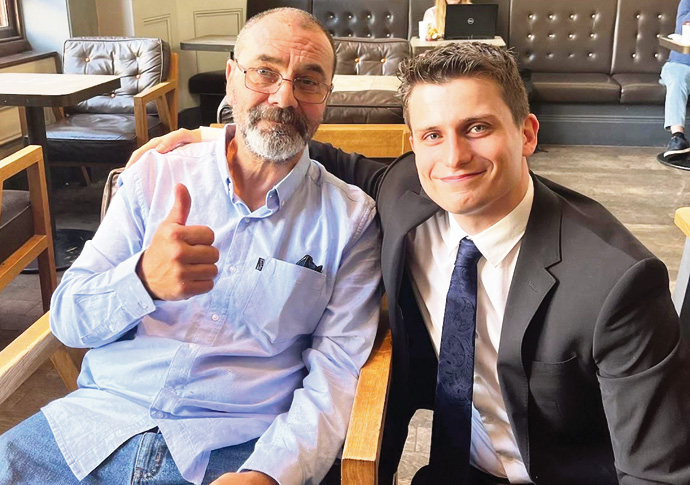John Gulliver: The defence case for activist lawyers
Andrew Malkinson’s wrongful rape conviction sensationally quashed after 17 years in prison
Friday, 11th August 2023

Andrew Malkinson, left, with James Burley
MISCARRIAGE of justice cases – and the government’s shameful response to them – have been dominating the national news agenda since the Court of Appeal sensationally quashed Andrew Malkinson’s wrongful rape conviction 17 years after he was sent to prison.
The case has exposed failures in the compensation process – which I wrote about last month when Sam Hallam took his case to the European Court of Human Rights – the frankly perverse system of charging those freed on appeal for “living costs” during time in prison, and “challenges” lawyers have in accessing evidence that is routinely withheld from them, intentionally or otherwise, by the police.
Wrongly convicted people like Mr Malkinson do not just get out of prison by chance; the state doesn’t suddenly come to its senses and atone for its mistakes.
It only ever happens after dogged perseverance of “activist lawyers”, often those working with heavy caseloads in their spare time and on incomes that are relatively low compared with what they could be earning for corporate legal work.
And with the huge cuts to legal aid over the last decade, fewer and fewer law firms have the time or inclination to have solicitors pursuing these kinds of long-haul cases.
In the Malkinson case, we have the Clerkenwell-based law practice and charity Appeal – and its ace investigator James Burley – to thank for twice taking Greater Manchester Police to court and bringing the police’s disclosure failings to light many years after his original trial was lost.
Mr Burley, who received special praise in the Court of Appeal’s judgment, has had an excellent grounding in life, having come in as an enthusiastic journalist on work experience at the Camden New Journal, back in 2013.
Recalling this formative period in his life, he told me: “I think I learnt more in my two weeks at the CNJ than in my entire degree.
“I remember I was sent to door-knock a nightclub owner, and he was really angry.
“It was a good experience for me, a lot of what I do now I have to go in cold. And I went to the coroner’s court and saw what a state that system is in.”
After his work experience, Mr Burley said he then got a job at the famous Skoob Books in Bloomsbury while volunteering as a caseworker two days a week for the human rights legal charity, Reprieve.
From there he got an internship in Louisiana in the United States, working on capital cases, before spotting a job advert at Appeal.
He has been working on the Andrew Malkinson case for more than five years.
He added: “We get a lot of people calling up – as you can imagine – and we don’t have time to take anything like all of them on as cases.
“With the ones we do take on, we just try and start digging and eventually you find stuff.”
Recalling the picturebook moment on the steps of the Court of Appeal last week, he said: “I really felt so satisfied to see Andy making his speech, which was incredible.
“But also I was just so happy to see all the cameras and press there and for them to know that he was telling the truth and for him to know that everyone was finally listening. It shouldn’t have taken this long, of course. We have plenty of other cases, and perhaps this will help raise their profiles.”
Mr Burley said that Appeal was now campaigning against obvious pitfalls of a system that relies on police disclosing evidence to criminal defence solicitors who are working against them, adding: “The trouble with this system is that for it to work you have to trust the police.”
The Criminal Cases Review Commission (CCRC) – which twice rejected the application to refer Mr Malkinson’s case to the Court of Appeal, in 2012 and in 2020 – has failed so many potential miscarriage of justice victims in recent years and is in need of urgent reform.
“A new legal mechanism should be introduced to challenge CCRC failings, and lawyers investigating miscarriages of justice should be given a right of access to police files,” Mr Burley added.
In a statement, Andrew Malkinson said this week: “The evidence needed to overturn my conviction has been sitting in police files for the past two decades.
“Yet the CCRC did not bother to look, and it fell to the small charity Appeal to bring it to light.”